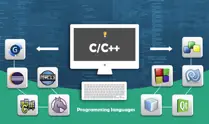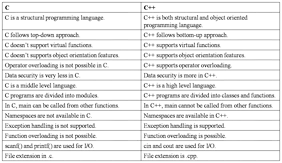C, C++ Developers Jobs
1. What is C/C++ developer?
A C/C++ developer is someone who has specialized programming skills in the two main programming languages C and C++.
C language: C is a low-level, powerful and flexible programming language widely used in embedded system development, system software, and platform applications.
C++ language: C++ is an object-oriented programming language developed from C, with many additional features such as classes, inheritance, polymorphism, and many other features that support the development of large and complex software.
C/C++ is used in a wide range of information technology fields such as system software development, computer applications, video games, embedded software, computer graphics, and many other areas. C/C++ programmers generally need to have a solid understanding of the syntax of these two languages, as well as an in-depth understanding of fundamental programming principles and techniques.

2. what a C/C++ developer typically does?
A C++ developer designs and develops software solutions using the programming language of the same name. In addition to programming, developing, and optimizing, their work also includes maintaining these software systems.
A C++ developer is generally responsible for building applications that can range from desktop applications to mobile applications and embedded systems in their daily work.
Programming is only the basic job of theirs. Developers in leadership roles do more than just simple programming. They are responsible for defining requirements, writing algorithms and overseeing implementation. They often work in large teams. There is continuous information exchange between designers and developers.
In addition, they also participate in project management issues. Related to core skills, they also perform documentation and care for software architecture maintenance.
3. What skills does a C/C++ developer need?
Technical Skills:
Proficiency in C and C++ Programming Languages:
- Mastery of C and C++ syntax and semantics.
- In-depth understanding of C++ features such as object-oriented programming, inheritance, polymorphism, and memory management.
Knowledge of Data Structures and Algorithms:
- Understanding of basic data structures such as arrays, linked lists, stacks, queues, trees, and graphs.
- Proficiency in sorting, searching, and data processing algorithms.
Memory Management:
- Understanding how to allocate and deallocate dynamic memory.
- Knowledge of memory management in C++ like smart pointers.
Multithreading Programming:
- Understanding of multithreading and synchronization.
- Experience working with the thread library in C++.
Systems and Networking:
- Knowledge of operating systems, file systems, and process management.
- Understanding of network programming and network protocols (TCP/IP, UDP).
Libraries and Frameworks:
- Experience working with C++ standard libraries (STL).
- Understanding of popular frameworks such as Boost and Qt.
Soft Skills:
- Problem-Solving
- Communication Skills
- Time Management
- Logical and Creative Thinking
- Self-Learning and Knowledge Updating
- Attention to Detail
4. C/C++ developer use which tools and languages?
C and C++ developer often work with many technical tools and software on a daily basis. In addition to IDEs like Visual Studio, Eclipse for development, some common ones include:
-
Version control systems: Git, SVN, Mercurial for managing code changes.
-
Build tools: Make, CMake, Unix tools like gcc/g++ for compiling code.
-
Debuggers: GDB, LLDB help detect and fix bugs.
-
Profilers: Instruments, Valgrind analyze performance bottlenecks.
-
Languages: Python is popular for scripting, automation. Also bash scripting.
-
Concurrent languages: Many C++ developers learn other languages like Go, Rust for parallel programming needs.
-
Scripts/APIs: JavaScript, Node.js for building applications and APIs.
-
Testing tools: Unity, Google Test for unit/integration testing.

5. Differences between C and C++![C, C++ Developers-003]()
![C, C++ Developers-004]()
![C, C++ Developers-005]()
6. Some requirements received by Aniday from clients for C/C++ Developer positions:
- Strong programming skills in C/C++
- Hands-on experience
- Understanding of embedded systems
- Skills to optimize code performance
- Knowledge of memory management and resource coordination
- Communication and teamwork skills
- Problem-solving skills
- Willingness to learn and adapt
- Understanding of other technologies














